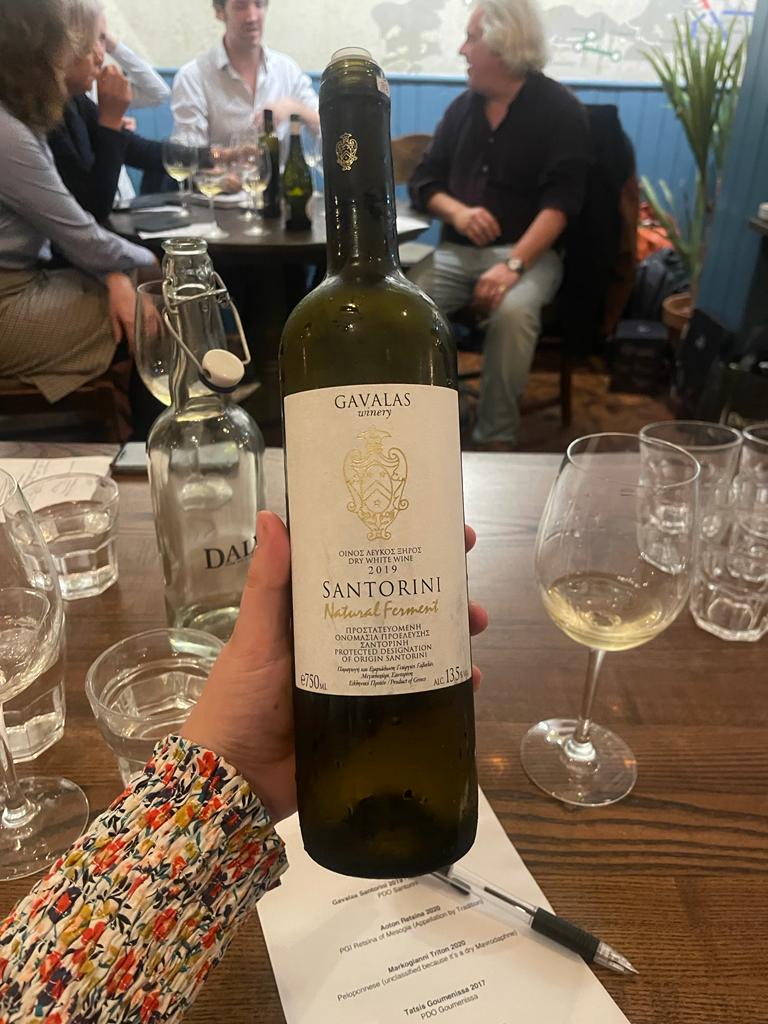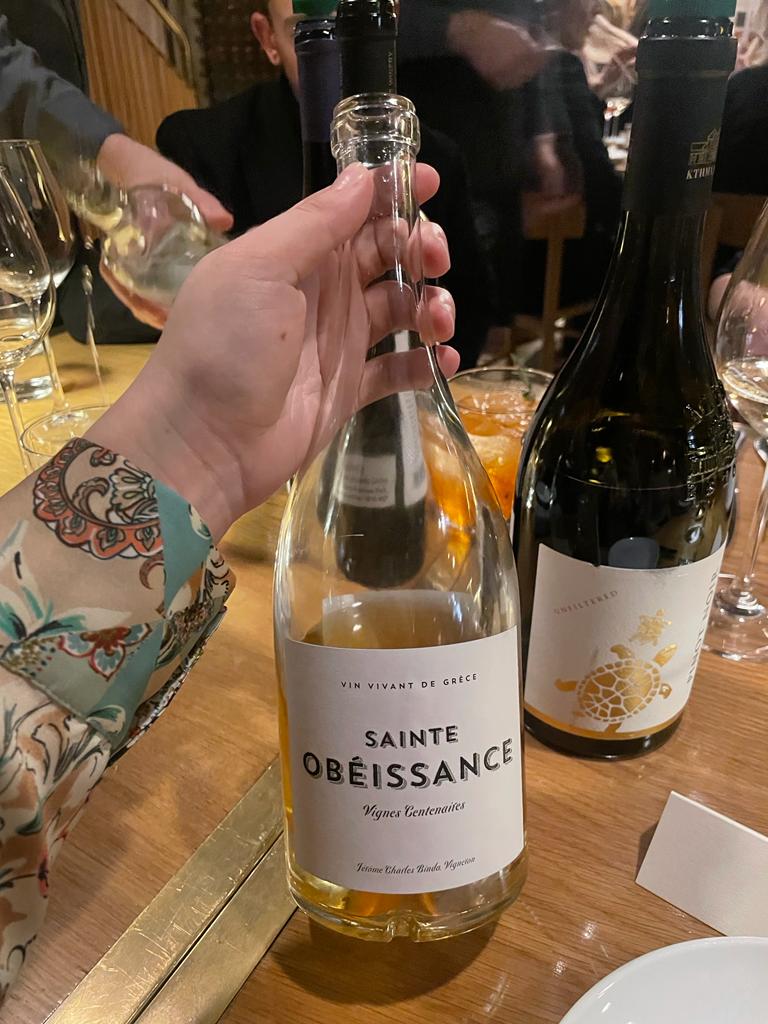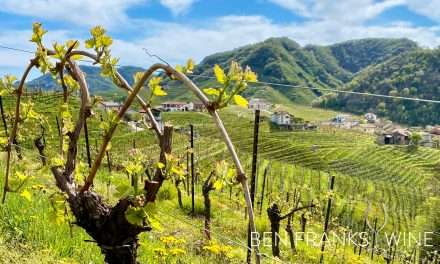Greece offers some of the finest Mediterranean wines you can try, born from a long history of winemaking and its colourful array of indigenous grape varieties. So how is it that Jessica Summer, one of the industry’s most exciting communicators, has only just started to enjoy these wines at home?
In her latest piece for Ben Franks Wine, Jessica explores her subconscious thoughts when it comes to buying wine outside of the day job and her newfound desire to buy more wines outside her comfort zone.
Even with my wine qualifications and launching my own wine and cheese business, Mouse & Grape, my wine buying habits at home seem to have stayed the same. I rarely purchase wines from outside of France, Italy, Spain or Portugal. I tend to buy wines made from grapes I know I like or from a specific regional style that fits my taste. I appreciate how difficult and intricate it can be to make wine, and I find the history behind each one fascinating, so being in wine and getting to drink the results of all this hard work I the icing on the cake.
I am passionate about wine. I’m curious to learn about new grapes, growing regions, and winemaking practices. Tasting events in the industry, books, blogs, qualifications and social media keep up my love and interest in wine, but behind closed doors I don’t often spend my money on buying wines outside of my comfort zone. Most people I know, too, buy wines they know they like. As a wine professional, how do I encourage myself and regular consumers to change their buying habits and to experiment more?
Does this confession make me basic in the wine world? Should I be more au fait with the wines of Greece, Slovenia and Romania? Why am I not considering the wine producing countries of Argentina, Chile, Australia and others?
I think, even as someone who works in wine, I am overwhelmed! There are so many wine to choose from, countless indigenous grape varieties that it’s hard to know where to start! As a wine communicator it is my responsibility to showcase the best wines from around the world, educate, and make recommendations to my audience. So today I am making a pledge to learn, be more adventurous, put my money where my mouth is and support winemaking regions and artisan winemakers who can push me (and hopefully you) outside my comfort zone.
Getting to know Greece
My first stop on my wine awakening is Greece! I was recently invited to attend two Greek wine events – the Maltby & Greek wine portfolio tasting dinner and Southern Wine Roads’ Premium Wines of Greece, so Greece felt like the perfect place to start!

Southern Wine Roads Tasting (pictured), co-hosted by Sophia Longhi.
Except for a couple of family holidays where I was too young to drink wine, a coming of age trip when I was 17 to Zante (which I’d rather forget), my Greek wine tasting experience has been very little. When I studied my WSET Level 3 there was a small two page section on Greek wines and, from memory, I don’t remember tasting any of the wines during the course. There’s also not much Greek wine to be found in supermarkets or specialist wine shops. The varieties I have come across like Agiorgitiko, Xinomavro and Assyrtiko are tricky to pronounce and hard to remember! So before attending the pair of Greek wine events I didn’t have much to go on. I am a bit embarrassed to admit that this lack of knowledge led me to believe that Greek wines must be downmarket because I hadn’t come across them (eek how arrogant is that?!). But, thinking about this logically, how on earth could this be? With Greece’s rich history of winemaking predating the chateaus of France, and with such diverse indigenous varieties grown in some of the most geologically inimitable places on the planet, why isn’t the Greek wine reputation as established as its European and Mediterranean neighbours?
Greece is a very special wine producing country; winemaking dates back as early as 4000 BC, making it one of the oldest wine-making regions in the world. The ancient Greeks were famous for their love of wine, mixing strongly concentrated wine with water, altering the ratio depending on their desired level of inebriation. Greece also has over 200 unique grape varieties, many of which are not grown anywhere else in the world. Despite its long history, Greek winemaking has had a turbulent journey to the present day. The Ottoman Empire’s rule over Greece from the 15th century to the early 19th century had a significant impact on the country’s winemaking industry. The Ottomans, who practised the Islamic faith, prohibited the production and consumption of alcohol, which included wine. This led to the decline of Greece’s winemaking industry, as many vineyards were abandoned and winemakers had to find other sources of income. However, winemaking did not completely disappear during the Ottoman period. Some Greek winemakers continued to produce wine illegally, despite the prohibition, and some wines were also produced for export to other countries. Greek Orthodox Christians were allowed to produce wine for religious purposes, such as for communion, and this helped to keep the tradition of winemaking alive. Additionally, some vineyards were able to survive by producing raisins instead of wine.
A new life for Greek wine
After Greece gained its independence, winemaking began to recover, experiencing a wine renaissance in the 1970 and 80s. This was thanks to the efforts of a new generation of highly skilled winemakers who prioritised quality over quantity.
One such example is Boutari, one of the oldest and most well-known Greek wineries, founded in 1879. In the 1980s, Boutari began to focus on producing high-quality wines that showcased the unique flavours of Greek grape varieties, such as Assyrtiko and Agiorgitiko. Boutari played a crucial role in introducing Greek wines to the international market and helped to put Greek wines back on the map. The use of international varieties such as Cabernet, Syrah and Chardonnay were an attempt to appeal to the international market but were less popular with the local palate and didn’t reflect the country’s unique terroir as well. Winemakers reintroduced the indigenous varieties, refining them and enhancing their distinctive flavours and aromas making them more popular both at home and abroad.
Today most of the wines produced by Greece are made using their indigenous grape varieties. Some of the most famous Greek grape varieties include Assyrtiko, Agiorgitiko, Xinomavro, and Moschofilero. My favourite of those is Assyrtiko, a white grape originating from Santori usually made in a dry, crisp style (although it is sometimes oaked) and with lemon flavours and salty minerality. This wine makes a wonderful pairing partner to Mediterranean fish dishes and the thought of sipping this wine chilled while overlooking the beautiful Santori coast is desperately making me want to book a holiday! By embracing their heritage and the unique wines that only they can make, Greek wines began winning awards through bodies such as the Decanter World Wine Awards and regaining their reputation internationally as a quality winemaking country.
Due to the lack of representation, I thought that a way for Greek wines to grow in popularity in the UK was to position themselves at the bottom of the market. If something is really fantastic to drink and excellent value for money, understandably its popularity will go up. I have observed this with the rise in popularity of Portuguese wines which are great value for money at the lower end of the market. Of course, there are more premium options available and Port also plays a huge part in Portugal’s wine trade. I could envision having Greek equivalents of supermarket Portuguese favourites like Aldi’s Animus Douro 2019 £5.49 or Sainsburys Porta 6 Vinho Regional Lisboa £6.50. Similarly to Portugal, Greece is a smaller wine producing country whereas somewhere like Spain or Italy produces high volumes of wine which can drive down the price. What I now realise, having attended these events, is that I had completely overlooked premium Greek wines.
When it comes to luxury wines and spending £30 plus on a bottle, I think of more well-known regions in the likes of France with Pomerol in Bordeaux and Côte d’Or in Burgundy or Italy with Barolo, Piedmont and Amarone, Valpolicella. Again, this thought pattern of mine is echoing my comfort zone and showing that I am seduced by well-known popular wine regions! When I want to spend more on a special bottle of wine I am overlooking wines of similar quality just because I don’t know them as well. When compared to those and similar wine-producing regions, Greek wines were not seen as equals in my mind despite the fact that the wines from Greece are of the same quality as some of the premium vineyards but without the big price tag. Greek wines at higher price points would be even more expensive from a well-known vineyard in another country.
The huge range of unique indigenous grape varieties, low yielding grapes which produce complex wines, the rich history combined with a tremendous value for money compared with their European counterparts, means it deserves equal attention. So now is the perfect time to explore Greek wines in all their forms: natural (low/no intervention in the winemaking process), biodynamic (a holistic approach to ecosystem farming), organic (grapes grown using the principles of organic farming), traditional (upholding historical methods of the region) and modern (using new technologies to streamline the production of wine). In particular, it is the exceptional quality of the natural and biodynamic wines which caught my attention at the tasting events. I think this style could be really important for building Greece’s reputation in the UK. Over the last couple of years I have noticed a growing popularity of this style of wines, together with orange wines.
Could Greece become the go to country for this popular wine trend in the UK?
Two natural wine favourites from Greece
Below are my two favourite natural wines from the events I think are a great starting point for you to try:

Gavalas Santorini 2019 – The Great Wine Co £36, tasted at the Southern Roads Wine Tasting.
This wine is made with biodynamic principles with low yielding Assyrtiko grapes. I fell in love with the salty minerality of this wine combined with fruity peach and citrus flavours. It has fresh and crisp acidity, with rich vanilla notes from a slow fermentation on the lees, really well balanced and extremely drinkable! I would pair this wine with a fresh goats milk cheese like Neal’s Yard Dairy Perroche or a crumbly fresh feta.

Domaine Kalathas ‘Sainte-Obeissance’ Aspro Potamisi-Rozaki Maltby & Greek £43, tasted at their tasting at Opso, Marylebone
An orange biodynamic wine made using Aspro Potamisi 80%, Rozaki 20% grapes. The grapes are hand-picked and sorted then foot trod and are exclusively self fermented. The wine has a unique expression of stewed stone fruits, peach compote, yellow apple, dried sultanas and a nutty quality. I would pair this wine with a 2 year aged gouda with salt crystals or a Belgian cheese called Old Groendal. Both the cheeses have a salted caramel and nutty flavour which would complement the wine and bring out the fruity flavours.
What’s your favourite Greek wine experience? Let us know in the comments below!
~
References:
https://www.goodpairdays.com/guides/wine-regions/article/greece/
https://blacksheeprestaurants.com/blog/7-things-you-did-not-know-about-greek-wine/
https://www.greeceandgrapes.com/en/greek-vineyard
https://www.themiddleland.com/interesting-facts-about-modern-greek-wine/






